Search Images
Browse Content (p. 892)
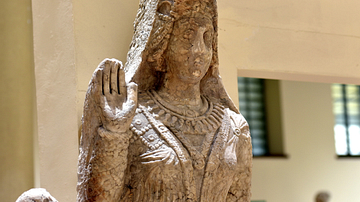
Image
Princess Doshafri from Hatra
This is the upper part of the statue of princess "Doshafri", daughter of king Sanatruq I of Hatra (reigned c. 140 - 180 CE). Although the statue is somewhat weathered, it is an excellent example conveying the appearance of a Hatrene princess...
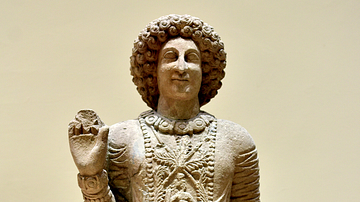
Image
Statue of Prince Absadmiya from Hatra
A statue of Absadmiya, the son of king Sanatruq I of Hatra (reigned c. 140 - 180 CE). His right arm is raised in salutation while the left hand holds a palm branch. He wears an elegant and exquisitely carved dress. The feet are lost. The...
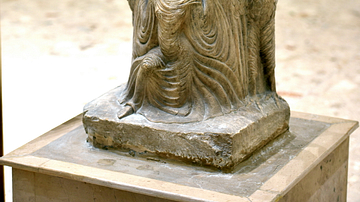
Image
Statue of Assur Bel from Hatra
This limestone statue, now headless, was found in the 5th temple, and probably depicts Assur. On the other hand, some scholars thinks this statue is of Za'im Mu'la. It depicts a male figure wearing full military attire and armor (very similar...
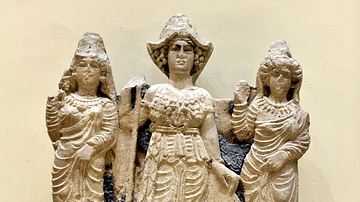
Image
Relief of Al-Lat from Hatra
This carved scene in relief depicts 3 women above a standing and roaring lion. In the middle Al-Lat (also Allat, Allatu, and Alilat) wears a wonderful military attire and head cap (similar to Athena). Her right arm holds a long spear while...
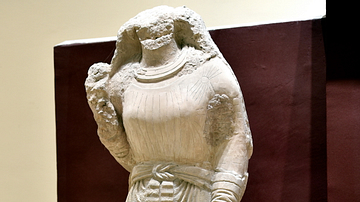
Image
Statue of Qimi Bin Abdsamiyah
Qimi Bin Abdsamiyah was probably a musician and/or a singer at the 5th temple in Hatra. Her father was a wine seller. Although the statue is now headless, it is considered one of the finest and precious finds from Hatra; her attire is very...
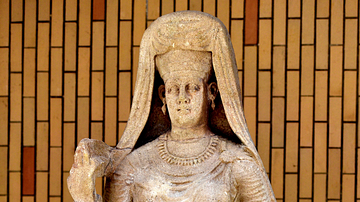
Image
Full Length Statue of Abu Bint Deimon, Hatra
Abu Bint Deimon was the wife of Sanatruq I (reigned c. 140 - 180 CE), king of Hatra. The statue represents one of the finest sculptures from Hatra. She wears elaborate headgear, earrings, necklaces, and bracelets. Her right arm is raised...
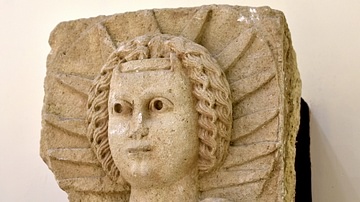
Image
Relief of Shamash from Hatra
Alabaster slab depicting a male figure, en face. Behind his head, a large disc with radiating rays appear. The figure is Shamash, the god of divine justice and the sun. From Hatra, Ninawa Governorate, Iraq. Parthian period, 1st to 3rd century...
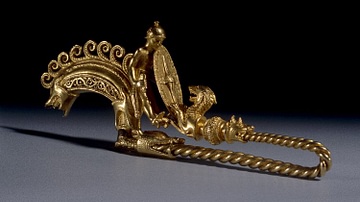
Image
Braganza Brooch
A 3rd Century BCE gold fibula depicting a Celtic warrior. A Celtic warrior with a sword, oval shield, and pointed helmet is depicted defending himself from a dog which is jumping on him, two other dog heads are on each end of the fibula...
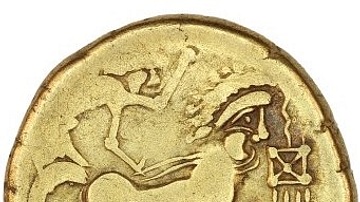
Image
Gallic Coin with Charioteer
The reverse of a 2nd Century - 1st Century BCE gold stater minted in Gaul. This side depicts a man riding a chariot which is being pulled by a horse with a stylized human face. From the British Museum in London.
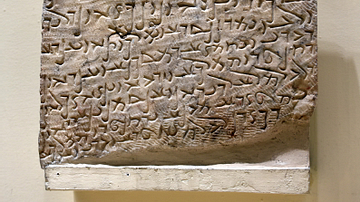
Image
Aramaic Inscription from Hatra
This marble slab was inscribed with an Aramaic script mentioning the name of "Hatra" as the center of the region "Araba". From the 11th temple at Hatra, Ninawa Governorate, Iraq. Parthian period, 1st to 3rd century CE. On display at the Iraq...